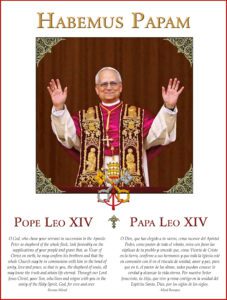The Sacraments
Baptism
Parents of an infant to be baptized and those who are to undertake the function of a sponsor are to be instructed properly on the meaning of this sacrament and the obligations attached to it.
Religious Education: Systematic Catechesis
In order to undertake the journey toward the Sacraments in a responsible manner, the National Directory for Catechesis outlines for us specific elements for teaching our faith. Among those is the call for complete and systematic catechesis. Systematic catechesis asserts that:
- The basic teachings of the faith as found in the Catechism of the Catholic Church need to be taught in a planned manner and be continually reinforced.
- The teachings of the faith are expanded upon and adapted to the age and ability of the learner.
- Instruction in the faith begins at home.
- As the child ages, others support parents in educating their child in the faith by providing systematic catechetical programs
- A variety of methods and techniques can be employed in the transmission of the knowledge of the faith. “Learning by heart” (memorization) is particularly important.
- What is to be memorized includes prayers, facts about Scripture, key themes and major figures in salvation history, facts about the church, worship and the church year, devotions, holy days, the saints, the works of mercy, the mysteries of the rosary, the Stations of the Cross, the Ten Commandments, the Beatitudes, the Gifts and Fruits of the Holy Spirit, theological and moral virtues, Precepts of the Church, principles of Catholic social teaching, the examination of conscience, and songs.
Ignatius Press, Family and Life Series that is used in our Religious Education Program was carefully selected in order to accomplish this systematic catechesis.
Religious Education & The Sacraments
If you have any questions please call Paige Fies, 772-562-5954.
First Reconciliation: Successful completion of Grade 1 is necessary for entrance into Sacrament Preparation in Grade 2. The children begin preparing to celebrate this sacrament at the start of Grade 2 Religious Education classes. Their First Reconciliation is in October. Parents are expected to assist in the sacramental preparation of their children, by reviewing and supporting their assignments brought home and by attending Sunday Mass.
First Eucharist: Preparation for the reception of First Communion begins after the children have made their First Reconciliation, in 2nd grade. Your child will receive their First Communion in the spring. As part of this preparation, parents are expected to assist in the sacramental preparation of their children by providing perfect attendance and weekly Mass.
Confirmation: The Sacrament of Confirmation is celebrated in January/February each year. Confirmation preparation is a 2 yr process, beginning in 8th grade. Youth in the Confirmation Yr. 1 Program, (8th) participate in classes, twice monthly, to prepare them for the sacrament. Preparation for Yr. 2 Confirmation will continue with twice-monthly classes from September- December, as well as each Candidate completing a Service Project, Letter to the Pastor & chosen saint name report. A mandatory Confirmation Retreat in early January is also an expectation, along with weekly Mass attendance.
Sacramental Preparation
Christian Initiation is celebrated in the sacraments of Baptism, Confirmation and Eucharist. Through these visible actions a young person is incorporated into the Church and shares its mission in the world. Full initiation into the Church occurs in stages.
Sacramental catechesis has traditionally been of two kinds: preparation for the initial celebration of the sacraments and continued enrichment following their first reception. Requirements for the reception of First Reconciliation, Eucharist and Confirmation are determined by Canon Law according to the following: Age of reason (to be able to distinguish right from wrong); Proper knowledge of sacraments; Emotional and spiritual preparation; Approval by parent, catechist, Director and Pastor.
The policy of St. Helen Parish is that a young (baptized) person who plans to receive the sacraments of First Penance and First Holy Communion must have completed one full year of the catechetical program (not counting kindergarten) and be currently enrolled in his/her second year before preparation begins.
Reconciliation
The Sacrament of Reconciliation reminds us that Jesus began His work on earth by calling people to repentance and faith: “Reform your lives and believe in the gospel.” (Mark 1:15). The sacrament of God’s love and forgiveness continues His work of forgiving and reconciling. Catechesis of children for Reconciliation must always respect the natural disposition, ability, age and circumstances of individuals and seeks to… make clear the relationship of the sacrament to the child’s life; help the child recognize moral good and evil, repent of wrong doing, and turn to Jesus and the Church for forgiveness.
Goal: encourage the child to see that, in this sacrament, faith is expressed by being forgiven and forgiving; encourage the child to approach the sacrament freely and regularly.
The first reception of the Sacrament of Reconciliation is celebrated in the spring. All children preparing to receive their First Eucharist must first be instructed and prepared to receive the Sacrament of Reconciliation.
Preparation of children for Reconciliation starts in the second grade level and is a joint effort between parent and catechist. Instruction includes the second grade curriculum covered weekly in class. There is also a focus on the sacrament of Reconciliation that helps children learn what it means to share Jesus’ gift of Himself, to know they are forgiven, and to understand that they belong to the community of Jesus’ friends – the Church.
Responsibilities of Parents as their Child prepares for Reconciliation: The example set by parents is of the utmost importance. Because parents are the primary educators of their children, they are responsible for initiating their children into the sacramental life of the church.
Parents serve as models for their children by being moral Christians; receive the Sacrament of Reconciliation regularly with their families; help children in forming a good conscience and a Christian code of morality; attend parent sessions and participate in activities and prayer services that are planned to help their child prepare for the Sacrament of Reconciliation; take time with their child to talk about Reconciliation, to read Bible stories and to pray together; determine their child’s readiness for Reconciliation.
Eucharist
The Sacrament of the Holy Eucharist is the heart of Christian life. Providing instruction on the sacrament of the Holy Eucharist helps children understand that the celebration of the Eucharist forms and nourishes the faithful with Jesus, the Bread of Life.
Catechesis for children seeks to strengthen their awareness of the Father’s love, of the call to participate in Christ’s sacrifice, and of the gift of the Spirit. Children are taught that the Holy Eucharist is the real Body and Blood of Christ, and what appears to be bread and wine are actually Jesus’ Body and Blood. They learn that the Eucharist is both meal and sacrifice and that it is a memorial of the Last Supper.
The sacrament of the Holy Eucharist is celebrated each April/May. All children preparing to receive their First Eucharist must have already received the Sacrament of Reconciliation.
Parents have a right and duty to be intimately involved in preparing their children for First Communion. Catechesis (instruction) aims to help parents grow in understanding and appreciation of the Eucharist and participate readily in catechizing their children. Parents are encouraged to attend the Sunday morning Parent Sessions to enrich their own faith or can volunteer in the classroom following the required Diocesan Protecting God’s Children requirements.
Catechesis for First Eucharist is conducted separately from catechesis for the Sacrament of Reconciliation, since each sacrament requires its own concentrated preparation. Beginning at the second grade level, preparation for First Communion is a joint effort between parents and catechists as described below: The second grade curriculum is covered weekly in class by the catechist and followed up at home by the parent. The First Eucharist program helps explain the Eucharist to children, familiarize them with the main events of Jesus’ life, help them to participate more meaningfully in the action of Mass, and receive Christ’s body and blood in communion in an informed and reverent manner.
Responsibilities of Parents as their child prepares for First Eucharist:
Because parents are the primary educators of their children, they are responsible for initiating their children into the sacramental life of the church.
Parents are also expected to:
Regularly attend mass with their children, serve as models for their children by being moral Christians; participate in the Sacrament of Reconciliation and Sunday Mass with their families; nurture their child in faith; attend scheduled parent sessions and participate in any activities and prayer services that are planned to help their child prepare for this important sacrament of Holy Eucharist. Take time to talk with their first communicant about the Eucharist, to read Bible stories and to pray together; determine their child’s readiness for the Eucharist.
The Religious Education Office at St. Helen is ready to support and assist you in any way we can. Please visit our office or call (562-5954) if you would like to register your child, obtain a schedule or have any questions or concerns. We look forward to seeing you!




